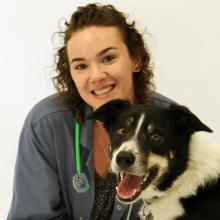Where do babies come from? Just kidding – I know that answer already and I’m sure you do too! But do you know how newborn calves fight off disease in their first few days of life? In the first few feedings that a calf takes, there is a substance called colostrum which is loaded with immunoglobulins that act as the building blocks for the calf’s immune system imparting maternal antibodies for protection.
During my externship I have the responsibility of partaking in a program from Zoetis, called Calf Start, which aims to help ensure that calves are receiving enough colostrum to protect themselves from common neonatal diseases. Each week, myself and my classmate Kate, will be visiting six farms to collect blood samples from calves aging from 24 hours old to seven days old and then measuring the total protein content of their blood. This total protein content is then used as a marker for successful passive transfer of maternal immunoglobulins to the calf at birth.
It is crucial that the calves ingest a large volume of colostrum in the first 24 hours of life as this is when the gastrointestinal system is most capable of absorbing maximum amounts of immunoglobulins. Failure of Passive Transfer (FPT), is when a calf does not successfully take in enough maternal immunoglobulins to protect itself from sepsis or other neonatal diseases. FPT is thought to be one of the major causes of neonatal illness and death in the bovine industry and therefore plays a massive economic role. Studies have been performed that show that calves who do not take in enough immunoglobulins also grow slower than calves that do which has a huge economic impact on farmers in the industry.
Under the guidance of Dr. Grant Scherer, this data will be used to identify farms that may need more education on how to ensure successful passive transfer in each calf that is born which will lead to healthier and happier calves. I feel so fortunate to be able to be a part of this and to get to improve my blood taking skills each week – not to mention spending some quality time with adorable calves!! Even though I do not plan on practicing in a rural area, it has been great learning about the role veterinarians play in educating their clients on better practices for the welfare of animals.
Who knows what adventures are headed my way next week – stay tuned!!
